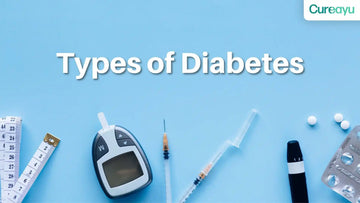Diabetes is one of the fastest-growing health challenges globally, affecting millions of people. As the condition continues to rise, understanding its different forms is essential for better prevention and management. There are several types of diabetes, each with its unique characteristics, symptoms, causes, and treatments. By being aware of the differences, individuals can take steps to manage their condition or even prevent its onset.
While most people are familiar with Type 1 and Type 2 diabetes, there are also lesser-known types like gestational diabetes and prediabetes. Each type varies in how it affects the body, what causes it, and how it can be treated. This blog will explore these types in detail, providing a comprehensive guide to understanding diabetes and how to manage it effectively.
Also Read: Uncontrolled Diabetes: Causes, Complications, and Effective Treatments for Better Health Management
What is Diabetes?
Diabetes is a chronic medical condition where the body either cannot produce enough insulin or cannot properly use the insulin it does produce. Insulin is a hormone that regulates blood sugar (glucose) levels, ensuring they don’t get too high (hyperglycemia) or too low (hypoglycemia). When insulin isn’t functioning as it should, glucose remains in the bloodstream instead of entering the cells, leading to high blood sugar levels.
Over time, elevated blood sugar can cause severe damage to various organs, including the heart, kidneys, eyes, and nerves. Diabetes can also increase the risk of other health issues like heart disease, stroke, and infections. Although diabetes cannot be cured, it can be managed through lifestyle changes, medication, and regular monitoring of blood sugar levels.
Types of Diabetes
Type 1 Diabetes
Type 1 diabetes, also known as insulin-dependent diabetes, is an autoimmune condition where the body's immune system mistakenly attacks and destroys the insulin-producing beta cells in the pancreas. This leads to little or no insulin production, requiring lifelong management with insulin therapy.
- Symptoms:
- Frequent urination: The body tries to eliminate excess glucose through urine, leading to frequent trips to the bathroom.
- Extreme thirst: Increased urination leads to dehydration, causing constant thirst.
- Sudden weight loss: Despite eating more, the body cannot properly use glucose for energy, leading to rapid weight loss.
- Fatigue and weakness: Without sufficient glucose in the cells, energy levels drop, causing extreme tiredness.
- Blurred vision: High blood sugar can cause swelling in the eye lenses, resulting in blurry vision.
- Increased hunger: The body's inability to use glucose effectively increases appetite as the cells signal a need for energy.
- Causes:
- Genetic predisposition: Certain genes can increase the risk of developing Type 1 diabetes, especially if a close family member has it.
- Autoimmune response: The immune system attacks and destroys the insulin-producing beta cells in the pancreas.
- Environmental factors: Viral infections and other environmental triggers may prompt the immune system to target pancreatic cells.
- Treatment:
- Daily insulin injections: Insulin must be injected regularly to regulate blood sugar levels, either through multiple daily injections or an insulin pump.
- Continuous glucose monitoring (CGM): This device helps track blood sugar levels in real-time to ensure they remain within a healthy range.
- Regular physical activity: Exercise improves the body's sensitivity to insulin, helping maintain better blood sugar control.
- Balanced diet: A low-carbohydrate diet, rich in fiber and lean proteins, helps manage blood sugar spikes.
Also Read: Understanding Blood Sugar Levels: Key Insights into Normal and High Ranges, Symptoms, and Management
Type 2 Diabetes
Type 2 diabetes is the most common form of diabetes, usually occurring in adults but increasingly being seen in younger people. It occurs when the body becomes resistant to insulin or does not produce enough insulin, leading to elevated blood sugar levels.
- Symptoms:
- Frequent urination: High blood sugar forces the kidneys to filter excess glucose, resulting in frequent urination.
- Increased thirst and hunger: Dehydration from frequent urination and inefficient glucose use causes persistent hunger and thirst.
- Slow healing of cuts or wounds: High blood sugar impairs circulation and the immune system, delaying the healing process.
- Numbness or tingling in hands and feet: Nerve damage (neuropathy) caused by prolonged high blood sugar can lead to these sensations.
- Fatigue: Insulin resistance prevents glucose from entering cells, resulting in low energy levels.
- Darkened skin patches: Insulin resistance can cause hyperpigmentation, especially in skin folds like the neck and armpits (acanthosis nigricans).
- Causes:
- Obesity or being overweight: Excess body fat, particularly around the abdomen, increases insulin resistance.
- Lack of physical activity: A sedentary lifestyle contributes to weight gain and reduces insulin sensitivity.
- Poor diet: Consuming processed foods high in sugars and unhealthy fats increases the risk of insulin resistance.
- Genetic predisposition: Family history of diabetes increases the likelihood of developing Type 2 diabetes.
- Insulin resistance: The body's cells become less responsive to insulin, requiring more insulin to control blood sugar.
- Treatment:
- Lifestyle changes: Regular exercise, weight loss, and a healthier diet can significantly improve blood sugar control and insulin sensitivity.
- Oral medications: Drugs like metformin help reduce blood sugar levels by improving insulin sensitivity and reducing glucose production in the liver.
- Insulin therapy: In advanced cases, insulin injections may be necessary to regulate blood sugar levels.
- Regular blood sugar monitoring: Keeping track of blood sugar levels helps manage diabetes and prevent complications.
- Managing associated conditions: It's crucial to control other health issues like high blood pressure and cholesterol to reduce the risk of complications.
Also Read: Exploring the Impact of Stress on Diabetes Development and Management
Gestational Diabetes
Gestational diabetes develops during pregnancy and affects how the body uses glucose. It typically resolves after childbirth but increases the risk of developing Type 2 diabetes in the future.
- Symptoms:
- Often no noticeable symptoms: Most women do not experience clear symptoms, which is why regular prenatal screenings are essential.
- Excessive thirst: Increased blood sugar levels can lead to dehydration and excessive thirst.
- Frequent urination: As the kidneys work to eliminate extra glucose, urination becomes more frequent.
- Fatigue: Higher-than-normal blood sugar levels can lead to feelings of tiredness and low energy.
- Causes:
- Hormonal changes: Pregnancy hormones can interfere with the body’s insulin response, making the body resistant to insulin.
- Obesity or excessive weight gain during pregnancy: Being overweight can increase the likelihood of gestational diabetes.
- Family history: A family history of diabetes may increase a woman’s risk of developing gestational diabetes.
- Treatment:
- Blood sugar monitoring: Regular monitoring ensures that glucose levels remain within a safe range during pregnancy.
- Gestational diabetes meal plan: Following a low-glycemic diet can help manage blood sugar levels.
- Physical activity: Exercise during pregnancy can improve insulin sensitivity and help control blood sugar.
- Insulin therapy: If diet and exercise do not control blood sugar, insulin therapy may be needed to ensure a healthy pregnancy.
- Post-pregnancy glucose monitoring: After giving birth, women should continue monitoring their glucose levels to detect any persistence of diabetes.
Prediabetes
Prediabetes is a condition where blood sugar levels are higher than normal but not high enough to be classified as Type 2 diabetes. It is a critical warning sign and, if left untreated, often progresses to full-blown diabetes.
- Symptoms:
- Often no clear symptoms: Many individuals with prediabetes may not experience noticeable symptoms, making it difficult to detect without testing.
- Fatigue and weight gain: Some people may experience subtle signs such as tiredness and unexplained weight gain due to inefficient glucose processing.
- Causes:
- Obesity or overweight: Excess fat, particularly around the abdomen, increases insulin resistance.
- Sedentary lifestyle: A lack of physical activity makes it difficult for the body to maintain normal insulin function.
- Poor dietary habits: Consuming excessive refined carbohydrates and sugars leads to poor blood sugar control.
- Family history of diabetes: Genetics play a significant role in prediabetes development, especially if close relatives have Type 2 diabetes.
- Treatment:
- Lifestyle modifications: Regular exercise and dietary changes can reverse prediabetes and improve insulin sensitivity.
- Balanced diet: Eating a diet rich in whole grains, vegetables, lean proteins, and low in refined sugars and carbs helps manage blood sugar.
- Weight loss: Losing just 5-10% of body weight can dramatically improve insulin sensitivity and reduce the risk of diabetes.
- Regular monitoring: Keeping track of blood sugar levels helps detect changes and prevent the progression to Type 2 diabetes.
- Medications: In some cases, doctors may prescribe metformin to help lower blood sugar in high-risk individuals.
Conclusion
Diabetes is a complex condition that affects millions of people worldwide, but with the right knowledge and lifestyle choices, it can be managed effectively. Each type of diabetes—whether it's Type 1, Type 2, gestational, or prediabetes—requires a different approach to treatment and management. By recognizing the symptoms early and understanding the underlying causes, individuals can take control of their health and reduce the risk of complications.
Living with diabetes requires continuous monitoring, discipline, and a proactive approach to lifestyle changes, but it doesn’t mean you cannot live a full, healthy life. Regular consultations with healthcare providers, maintaining a balanced diet, staying active, and adhering to prescribed medications are key to managing this condition. Early detection and intervention are critical, so it’s essential to stay informed and vigilant about any changes in your health.












